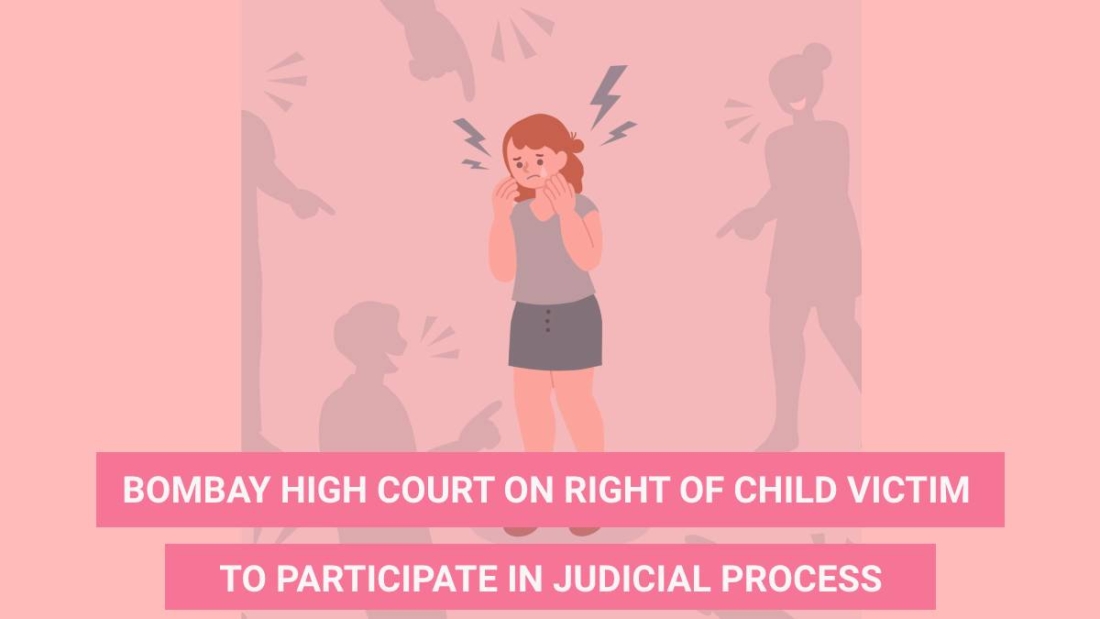The Bombay High Court in “Arjun Kishanrao Malge vs State of Maharashtra” on 8th April 2021 issued guidelines for the effective implementation of the Protection of Children from Sexual Offences Act, 2012 (“POCSO Act”) to ensure that the right of a child victim to participate in the Judicial process is protected.
The petitioner (a social worker, who also performs the role as a support person in child sexual abuse cases before the Child Welfare Committee) comes across several cases under the POCSO Act, in which the Courts and the police have overlooked or failed to give effect to the mandate of Section 40 of the POCSO Act read with Rule 4 of the POCSO Rules.
Section 40 of the POCSO Act enumerates the rights of a child, to take assistance of a legal practitioner. The proviso below Section 40 mandates that if the family or the guardian of the child are unable to afford a legal counsel, the “Legal Services Authority” shall provide a lawyer to them.
Rule 4 of the Protection of Children from Sexual Offences Rules, 2020 (“POCSO Rules”) provides for a procedure for care and protection of the child. The sub-rule (Rule 4(13) and 4(15)) under Rule 4 provides for an obligation on the Special Juvenile Police Unit (SJPU), or the local police to keep the child and child’s parents or guardian to be informed about the developments, including the arrest of the accused, applications filed and other Court proceedings, and status of the investigation, verdict of the trial. The object of this provision is to ensure participation of the victim in the administration of justice, in POCSO cases.
The Hon’ble Court while reiterating that the POCSO Act & Rules is a special legislation enacted by the Parliament with an object to provide a statutory shield to protect children from the offences of sexual assault, sexual harassment and pornography and provide for establishment of Special Courts for trial of such offences; opines that the POCSO Act read with Rules 4(13) and 4(15) of the POCSO Rules shall recognize a statutory entitlement to the assistance of and representation by legal counsel for the family or the guardian of the child and entitlement to be present and to participate in proceedings in accordance with the said provision.
The Bench of Chief Justice Dipankar Datta and Justice GS Kulkarni gave the following directions:
- When an application is made before the Court on behalf of the prosecution, it shall be the duty of the office of the public prosecutor to issue notice of hearing of such application to the child’s family.
- When an application is made before the Court on behalf of the accused, it shall be the duty of the accused to issue notice of hearing of such application to the child’s family.
- It shall be the duty of the Special Juvenile Police Unit (SJPU) to give the court reasons in writing if the victim’s family, guardian or legal counsel could not be put to notice regarding the court’s proceedings.
- The Court further states that when the proceedings under the Act would also relate to an offence under Sections 376(3), 376-AB, 376-DA or 376-DB of the Indian Penal Code (i.e. offenses related to rape), the notice to the victim shall be issued under Section 439(1-A) of Criminal Procedure Code (which deals with bail of the accused) read with Rule 4(13) and 4(15) of POCSO Rules.
The Bench gave directions for a copy of the judgment to be circulated to all presiding officers of all Sessions Courts in Maharashtra, the Director-General and Superintendent of Maharashtra Police, Director of Prosecution, State of Maharashtra and Maharashtra State Legal Services Authorities.
– Vaishali Jain, Paralegal – Child Safety at Work
 Cart is empty
Cart is empty 


Add a Comment